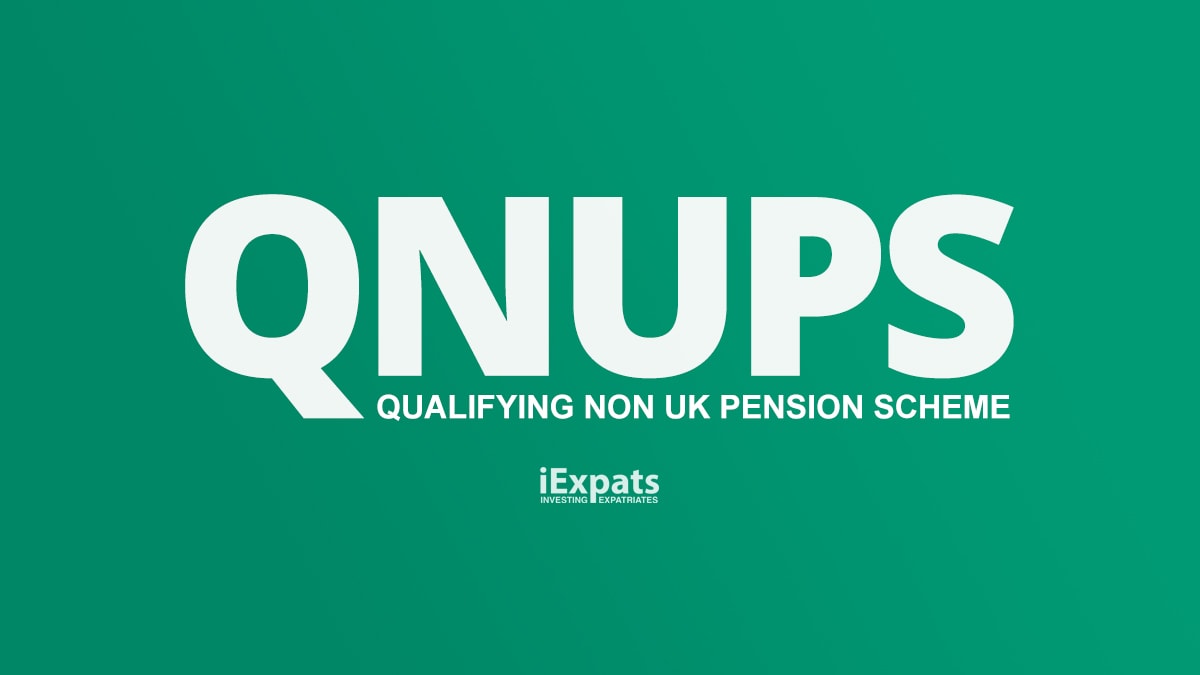If you are an expat looking for the best offshore retirement saving package, then a QNUPS, Qualifying Non UK Pension Scheme, may be just what you need.
Table of contents
QNUPS are specialist offshore pensions for expats – but not just the wealthy.
They can offer excellent benefits for many expats and provide a neat tax solution for passing wealth between the generations.
QNUPS are quite straightforward – it’s how pension firms and advisers surround them with mystery for marketing that makes them complicated.
And the good news is they are perfectly legal for British expats and won’t get anyone into trouble over tax avoidance if the rules are followed.
What is a QNUPS?

QNUPS stands for Qualifying Non UK Pension Scheme.
In fact, a QNUPS is not really a pension but a set of rules that must be followed to put the fund beyond the reach of inheritance tax (IHT) in the UK. QNUPS have been on the pension scene for a decade but have earned little recognition outside of a group of international financial advice companies.
But they are a useful retirement solution as the rules – the Inheritance Tax (Qualifying Non UK Pension Schemes) Regulations 2010 [SI 2010/0051] – say the fund is not liable to IHT unless HM Revenue & Customs can prove deliberate tax avoidance.
How QNUPS Work?
Besides meeting UK QNUPS rules, the pensions must comply with local rules set by financial regulators in the country where they are based.
Broadly, a master trust appoints the QNUPS provider as a trustee and defines how the pension is managed by basing a structure on the HMRC and local regulator rule books.
The main points the rules must cover are:
- The trustee must be outside the UK or the pension cannot become a QNUPS – which means no UK-based pension providers can offer QNUPS.
- QNUPS are characterised by offering a wide range of investments, including cash, bonds, property, commodities and even alternative investments like fine art and wine.
- Trustees hold funds for pension savers and can invest on their behalf.
- Most QNUPS have a professional investment expert to manage their fund.
- The trustees are responsible for the day-to-day running of the QNUPS
Unlike other offshore pensions for expats, like the Qualifying Recognised Overseas Pension Scheme (QROPS), a QNUPS has no obligation to report details of the member’s fund to HMRC.
Interested in setting up a Trust? Check out the fintech Atom Trust App review here.
Starting A QNUPS
Although a QNUPS provider must be based outside the UK, the retirement saver can be a British resident or expat.
Its important to understand the difference between residence and domicile before making financial decisions.
Financial advisers find QNUPS useful is some specific scenarios:
Retirement savers who are likely to breach the UK lifetime allowance for pension savings of £1.073 million can pay their excess contributions into a QNUPS, which has no lifetime saving cap. The move avoids the inevitable tax penalties that come with breaching the pension savings limit in the UK.
QNUPS are also useful for expats on the move who may have a home in one country but live in other countries for long periods on assignment. The QNUPS is structured to sit in one country while an expat lives in another.
QNUPS are also useful for avoiding UK IHT on unspent pension funds when a retirement saver dies. A QNUPS is not taxable under UK IHT rules and allows any remaining funds to pass to the member’s named beneficiaries, who do not have to be listed in a will.
Choosing a QNUPS adviser
Anyone considering a QNUPS should take expert financial advice from an international IFA familiar with QNUPS and QROPS transfers. It’s also important to look at the interaction of cross-border taxes on QNUPS benefits.
Get in contact with a qualified QNUPS adviser by filling out this form here.
Transferring UK pensions to a QNUPS
Moving an onshore pension into an offshore QROPS is not a good idea.
HMRC treats the moving of UK pension rights as an unauthorised withdrawal and slaps a penalty of 55% of the value of the transfer on the retirement saver.
However, retirement savers can move other offshore pension funds that do not include UK tax-relieved contributions, although some countries may impose tax on the transfer.
Paying into a QNUPS
Employees and employers can both pay into a QNUPS, but the contributions are unlikely to benefit from tax relief or other tax breaks.
QNUPS and tax
How benefits paid from a QNUPS are taxed depends on the residence status of the pension and the retirement saver.
An expat in Dubai can expect to pay no tax on benefits, while those in other countries may find tax is due on any drawings from the fund.
Why QNUPS?

QNUPS are tax-effective way to save for retirement and shelter assets from wealth taxes on death for many expats.
They come with many benefits and features – some of which are exclusive to QNUPS:
- Some expats may carry on contributing to a QNUPS after retirement
- Expats can draw down their funds knowing any unspent money will pass to their nominated beneficiaries on death
- Unlike most UK pensions, contributions need not come from earned income
- QNUPS have no cap on fund size, providing the level of saving and investing is considered sensible to maintain the saver’s standard of living
- QNUPS investments and other assets grow tax-free although cross-border taxes may apply
- QNUPS are widely available in many countries and unlike QROPS, the providers do not have to be based in a country with a double taxation agreement with the UK
- No maximum age limit to take a QNUPS – most UK pensions have an age cap at 75 years old
- QNUPS have no minimum starting amount, although providers may impose contribution levels. Some local regulators may also apply minimum and maximum fund sizes
- QNUPS are anchored to the country where the provider is based, allowing expats to move freely without cashing in their savings
- Some QNUPS allow in specie contributions, meaning assets like property, stocks, shares and even art and antiques do not have to be converted into cash for transfer into the pension
- Retirement savers can draw 25% of their QNUPS fund tax-free
QNUPS and HMRC
QNUPS come with some efficient tax breaks for retirement savers, but HMRC will step in if the scheme is seen as tax avoidance rather than lifetime saving for retirement.
For most expats, property profits should stay in the fund until after retirement to avoid capital gains tax. Learn more about buying a property abroad and the tax implications to be aware of.
Although HMRC does monitor how a QROPS is managed, savers and providers do not have to report changes to HMRC like expats with QROPS.
QNUPS Pensions For Expats FAQ
QNUPS are not generally widely known offshore pensions and sometimes the technical and tax aspects of the scheme are misunderstood by expats.
Like all tax breaks, QNUPS are not suitable for every expat and IFAs will tailor their recommendations for the pensions to match personal financial circumstances.
For expats who want to find out more about QNUPS, here are some answers to the most asked questions about the pensions.
British residents can start a QNUPS and save into the scheme, but any contributions would not qualify for tax relief. Benefits paid by the QNUPS would be liable to UK income tax.
The scheme rules do not allow for transfers unless the QNUPS ceases to trade
No. The overseas transfer charge specifically applies to QROPS pensions for expats and not QNUPS or international SIPPs. Confusingly, QROPS are QNUPS but not all QNUPS are QROPS.
The lifetime allowance of £1.073 million is the maximum amount UK residents can save into one or more pensions during their lifetime – typically their working life of 18 to 75 years old. Excess contributions are taxed by HMRC.
Some wealthy expats shatter the savings ceiling if they continue building UK pension funds.
A QNUPS allows them to sidestep these rules by transferring some or all their funds offshore.
This has two effects – the saver avoids paying penalties for breaching the lifetime allowance and the fund moved to the QNUPS continues to grow free of any restrictions.
Where the QNUPS is based does not matter if the pension is outside the UK. This means a QNUPS can be based in one country and the expat in another.
This also solves the expensive problem of cashing in and restarting pensions if the expat is on the move.
Expats should take professional tax advice to establish their residency status before starting a QNUPS to understand the tax implications of investing and withdrawing benefits.
Broadly speaking, yes, although some providers apply minimum fund levels and other scheme rules.
Unlike QROPS, HMRC does not supervise QNUPS nor publish a list of open schemes.
QNUPS are particularly attractive retirement options for expats regularly moving between countries or those who live in countries without a QROPS provider.
Many countries provide QNUPS, but three of the leading financial centres are Malta, Guernsey, and the Isle of Man, thanks to their strict regulation and beneficial tax regimes.
But expats should not pick a QNUPS based on geography. It’s better to look at the costs and benefits with a suitably qualified whole-of-the-market IFA who will match a QNUPS to your personal and financial goals.
Many countries provide QNUPS, but three of the leading financial centres are Malta, Guernsey, and the Isle of Man, thanks to their strict regulation and beneficial tax regimes.
But expats should not pick a QNUPS based on geography. It’s better to look at the costs and benefits with a suitably qualified whole-of-the-market IFA who will match a QNUPS to your personal and financial goals.
There’s no funding limit on QNUPS pensions but HMRC will want to check if the amount you save outruns the amount you need to maintain your standard of living. The check is to make sure savers are not flouting money laundering and tax avoidance rules.
Expats can only move their UK pension funds offshore if the QNUPS also has QROPS status otherwise tax penalties starting at 55% of the value of the transferred fund are imposed.
Moving a UK pension fund to a QNUPS with QROPS status could also trigger the overseas transfer charge of 25% of the fund value unless strict QROPS residence rules are followed.
Yes. Expats can transfer non-UK assets into a QNUPS if the scheme rules allow the move.
How old you must be to access the funds depends on the scheme retirement age, which can vary between countries.
In Malta, the age is 50 years old, while in Guernsey, savers must wait the extra five years until they are 55 years old.
QNUPS are defined contribution pensions and do not give retirement income guarantees. Instead, the benefit level is based on fund value, which can rise and fall in line with global markets.
No. This would be considered as tax avoidance by HMRC, but residential investment property, such as buy to lets and houses in multiple occupation (HMOs) should be OK.
Each of these pensions offers some different retirement saving and tax opportunities for expats. It’s not a matter of which pension is the best, but which one matches an individual’s personal and financial objectives. This is where a specialist IFA can help with a tailor-made retirement plan.
Related Information
Below is a list of related articles you may find of interest.

I would like to have more information on QNUPS. I am UK deemed domiciled, and have not contributed to a UK pension.